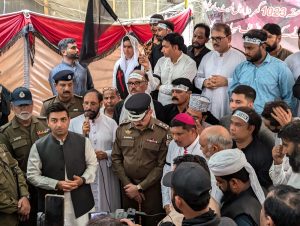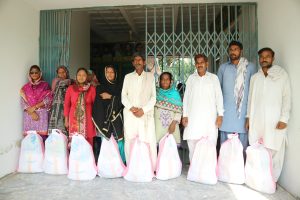 One year after the Jaranwala riots, Christians are calling for justice as most of those arrested in connection with the attack have been discharged or released on bail. The photo shows Faisalabad Police Chief Kamran Adil standing in solidarity with Christians in Jaranwala on 16 August 2024.
One year after the Jaranwala riots, Christians are calling for justice as most of those arrested in connection with the attack have been discharged or released on bail. The photo shows Faisalabad Police Chief Kamran Adil standing in solidarity with Christians in Jaranwala on 16 August 2024.
Around ninety Christian homes were destroyed and more than four hundred homes and 25 church buildings were damaged and looted on 16 August 2023 when a mob of thousands of Muslims attacked the Christian community in Jaranwala, 40 km from Faisalabad in Punjab province.
The violence followed false allegations of blasphemy against Christian brothers Raja Amir Saleem Masih and Rocky Saleem Masih, who were charged under Pakistan’s blasphemy laws but were acquitted earlier this year after an anti-terrorism court found that they had been framed by another Christian following a personal dispute.
Over three hundred people were arrested but only a dozen suspects are facing trial in an anti-terrorism court, according to lawyer and political leader Akmal Bhatti, chair of the Minorities Alliance Pakistan.
“A majority of the suspects have either been bailed out or were discharged from the cases due to defective police investigation,” he told Christian Daily International-Morning Star News. “The Jaranwala incident is a stark reminder of the challenges faced by religious minorities in Pakistan. The government’s failure to bring the perpetrators to justice shows its [lack of] interest in protecting religious minorities from future violence.”
Amnesty International found that only 380 of 5,213 suspects were arrested, and stated: “Of the arrested suspects, 228 were released on bail and 77 others had the charges against them dropped,” adding that trials of suspects have not started and that about forty percent of victims who lost property are still awaiting government compensation.
“Despite the authorities’ assurances of accountability, the grossly inadequate action has allowed a climate of impunity for the perpetrators of the Jaranwala violence,” said Babu Ram Pant, Amnesty International’s deputy regional director for South Asia.
Christians in Pakistan and around the world pledged to support Jaranwala’s Christian community after the attack and Church in Chains sent aid via CLAAS (see below).
Intimidated and ostracised
Members of Jaranwala’s Christian community say that local Christians have faced intimidation and ostracisation after the attacks. “The situation has worsened as our Muslim neighbours and other people have stopped talking or doing business with us,” Salim Masih told Christian Daily International-Morning Star News. “I used to run a tailoring shop and had three or four Muslim apprentices, but after the incident my Muslim landlord told me to vacate the shop, and my staff also refused to work under me.” He said he is unable to provide for his family as he receives a fraction of the orders he used to get before the attacks.
Local resident Yaqub Gill said he was one of the complainants in 17 private cases filed by Christians, along with five registered by the state. “I was constantly threatened by local Muslims to withdraw my complaint,” he told CDI-MSN. “I informed the police, but instead of taking action against those people, they framed me in a fake case. A lot of our people worked in nearby factories but after the incident, many were fired from their jobs. Those having small businesses have suffered financial losses because the local Muslims are not doing business with them.”
Yaqub Gill said Christians were threatened by members of extremist party Tehreek-e-Labbaik Pakistan to withdraw from the cases. “Due to the threats, many Christians refused to stand as witnesses in court, leading to bails for the suspects,” he said.
Salman Farooq of the Human Rights Commission of Pakistan said that among those bailed in recent months was Younis Machhi, who had made the announcement on the mosque loudspeaker calling people to gather. “There’s clear video evidence of Younis Machhi inciting the people to attack Christians, yet he too has walked free on bail,” he said. “Almost all those who have been freed from custody have been hailed as heroes on their return.”
Salman Farooq added that many Jaranwala Christians have complained of police detention and torture, and stated: “Apart from this, the families have not been completely rehabilitated, and while the government promised compensation money, not every household has managed to acquire this because in some households there are multiple families staying after their homes were destroyed, and the less powerful residents of that household have not been able to take the money. At least fifty families have not received the money.”
He also stated that relations between the Christian and Muslim communities soured after the attacks, saying: “Christian workers are being fired from their workplaces, including factories in and around that tehsil and in Faisalabad as well. Children are facing discrimination in schools from other children as well. It’s a sad situation.”
Church of Pakistan President Bishop Azad Marshall commented, “The Jaranwala incident questions the effectiveness and enforcement of legal protections for minorities” and added, “We filed a petition in the Lahore High Court seeking the formation of a judicial commission to investigate the incident and hold the negligent officials accountable, but the provincial government fiercely opposed it. We feared that the suspects would not be prosecuted, and this is exactly what has happened.”
The bishop said that with the rise of threats from extremist groups like Tehreek-e-Labbaik Pakistan, tensions demand immediate and decisive action by the government.
Church in Chains sends aid
 The Punjab state government pledged support to all who had suffered loss, but in the immediate aftermath of the attack Church in Chains sent funds to partner organisation CLAAS/Edge Foundation to enable local staff to distribute emergency aid in Jaranwala and other towns in the surrounding area. Distribution of aid funded by Church in Chains took place in September and October and included water, flour, rice, lentils, powdered milk, tea bags and sugar. Some families also received cash to purchase urgent necessities and medications.
The Punjab state government pledged support to all who had suffered loss, but in the immediate aftermath of the attack Church in Chains sent funds to partner organisation CLAAS/Edge Foundation to enable local staff to distribute emergency aid in Jaranwala and other towns in the surrounding area. Distribution of aid funded by Church in Chains took place in September and October and included water, flour, rice, lentils, powdered milk, tea bags and sugar. Some families also received cash to purchase urgent necessities and medications.
(Christian Daily International-Morning Star News, Church in Chains, CLAAS)
Photos: Christian Daily International-Morning Star News, CLAAS
